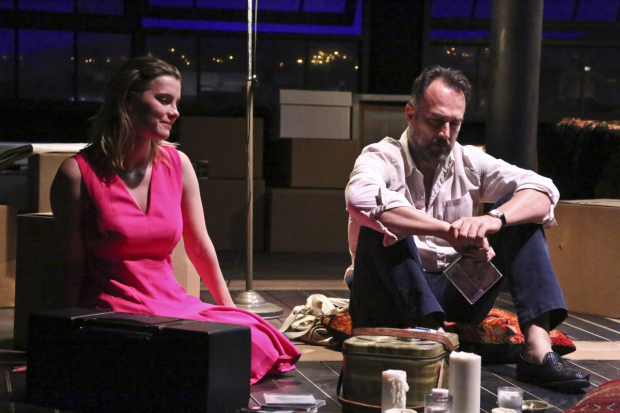
(© Michael Lamont)
Very early in playwright Bess Wohl's Barcelona, a dignified Spaniard named Manuel is left temporarily alone in his small Catalonian apartment while Irene, the drunken American tourist he has just bedded, is vomiting in his bathroom. Now it's decision time for Manuel, and we can't quite tell if this unreadable man is going to politely ask this boorish twit to leave or hurtle her out the nearest window.
Happily he does neither as this cross-cultural collision unfolds over the ensuing and intriguing 80 minutes. Director Trip Cullman's production for the Geffen Playhouse is part love story, part sociopolitical jousting match that is beautifully played out by actors Betty Gilpin and Carlos Leal. Liberally laced with humor, a dash of outrage, and a certain narrative predictability, Barcelona does not always twist and weave as artfully as it might. Still, Cullman's sure-handed production and the work of its two performers keep us continually interested and invested.
"I never ever do this," a giggling Irene insists after the acrobatic sex she has just enjoyed with Manuel, the Spaniard she picked up in a bar. And yet she has this time, and for rather specific reasons. Irene, a realtor from Colorado, is in town as part of a bachelorette party weekend. Jet-lagged and hung over, she finds herself in a cluttered apartment strewn with packing boxes, across the street from the famous La Sagratta Familia cathedral. What's more, she's taking a postcoital nightcap while defending her country's politics ("at least we try…to be helpful") to a man who, for reasons not yet made clear, may despise her. Initial impressions aside, Irene will prove to be not nearly the caricature she first appears to be.
Manuel is older, more guarded, and far less drunk than Irene. Plus he's in his own apartment in his country. We ultimately learn his motives for picking up Irene, and why all the boxes in this, his secondary residence, are largely empty — even if the movers are supposed to be arriving at dawn. Suffice to say, neither character is whom he or she first appears to be, and if Manuel intended this encounter to be a power play or an act of self-gratification, things are not going according to plan.
As the night falls away, the electrical power goes out and the relationship between these two crossed and unlikely souls plays out in darkness pierced only by a series of candles (lighting designer Japhy Weideman also illuminates the apartment with a twinkling skyline outside a dusty bank of bay windows). The plumbing is rusty, and instead of water, Manuel breaks out a bottle of Rioja and, later, a Maria Callas CD. The scenario is ripe for burgeoning romance, which both characters recognize, but these stakes are higher than both anticipate.
Wohl moves Irene from a shallow caricature of an American bimbo to something sadder and deeper, though it's not always the most credible of journeys. Still Gilpin, who played a sexpot doctor during the last few seasons of Showtime's "Nurse Jackie," has considerable charisma to go with her acting chops. Whether watching her melt over the discovery of a stuffed animal or wrapping herself around Leal's knees after she has just cursed him out, we see, in Gilpin's performance, a character who indeed possesses the heart of "a crazy puppy." It is no mean feat, as Gilpin ably demonstrates, to smartly play a ditzy character. Leal partners her wonderfully. Possessed of solid deadpan comic timing, a worn face, and an air of mystery, Leal keeps Manuel elusive and a little dangerous. His character's transition, however, is somewhat more credible than Irene's.
As the play's title suggests, the city of Barcelona and its famed "unfinished" cathedral play a key role in the proceedings. Though Mark Wendland's set never gives us a glimpse of La Sagrada Familia, the very fact that it's out there, looming over the proceedings, serves as a kind of thematic beacon of Wohl's play. With everything they have been through, a pair of lovers like Irene and Manuel certainly could use a "monument to perseverance" like La Sagrada. So could we all.








